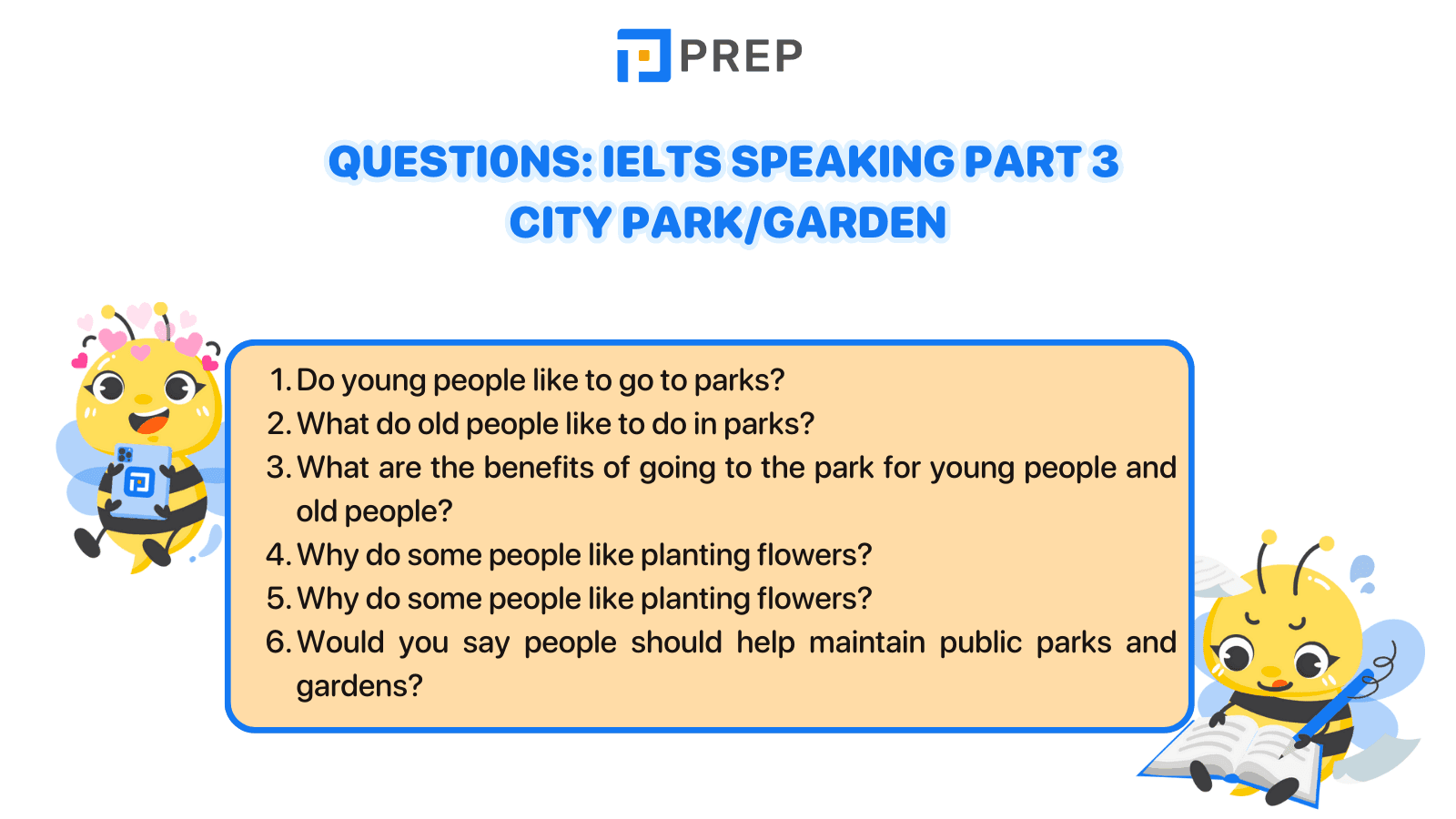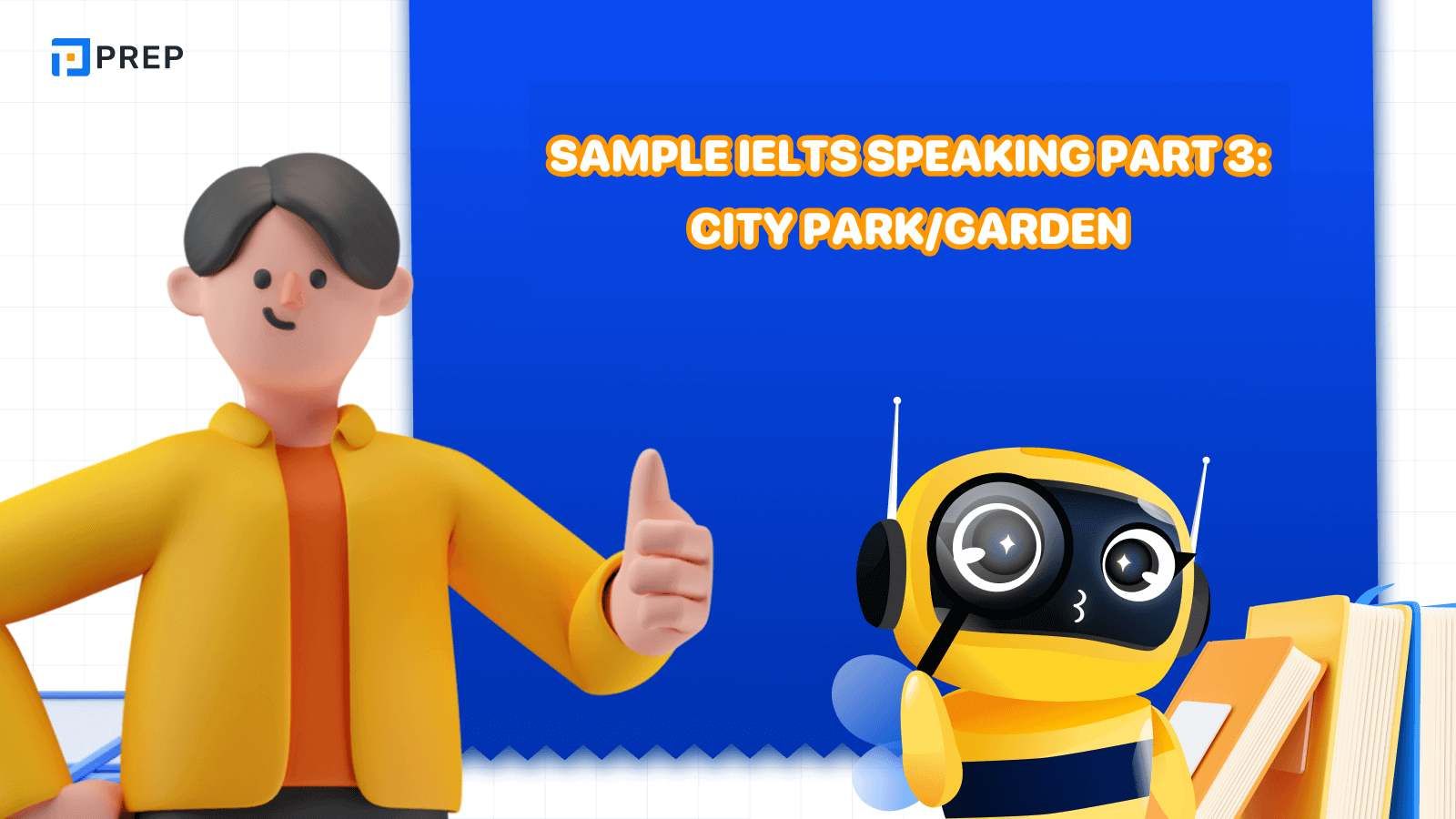IELTS Speaking Part 3 City park/garden
The topic of "City park/garden" is quite a new one in the IELTS Speaking Part 3 test. For this topic, what kind of questions do the examiners usually ask? Let's follow along with PREP to explore the list of questions, sample answers, and useful vocabulary in IELTS Speaking Part 3 City park/garden.
*This sample was prepared by Mr. Nhat Pham, an IELTS 8.5 Overall achiever (9.0 Listening, 9.0 Reading, 8.0 Writing, 7.5 Speaking) and Marker Leader at PREP.
- I. IELTS Speaking Part 3 questions with answers on City park/garden
- II. IELTS Speaking Part 3 topics with answers related to City park/garden
- 1. Do young people like to go to parks?
- 2. What do old people like to do in parks?
- 3. What are the benefits of going to the park for young people and old people?
- 4. What benefits can parks bring to a city?
- 5. Why do some people like planting flowers?
- 6. Would you say people should help maintain public parks and gardens?

I. IELTS Speaking Part 3 questions with answers on City park/garden
Below, PREP would like to share a list of common IELTS Speaking Part 3 City park/garden questions:
-
Do young people like to go to parks?
-
What do old people like to do in parks?
-
What are the benefits of going to the park for young people and old people?
-
Why do some people like planting flowers?
-
Why do some people like planting flowers?
-
Would you say people should help maintain public parks and gardens?

II. IELTS Speaking Part 3 topics with answers related to City park/garden

Let's explore the sample questions typically found in IELTS Speaking Part 3 sample answer related to City park/garden together with PREP!
1. Do young people like to go to parks?
I guess yes, the youth often enjoy spending time in parks, albeit their preferences may vary. Some relish outdoor activities like sports, picnics, or jogging, appreciating the green space for exercise and socializing. Others seek tranquility in the natural environment for relaxation, perhaps reading a book or meditating. Parks provide a respite from the digital world and encourage a healthier lifestyle among the younger generation.
Vocabulary commonly used in IELTS Speaking Part 3 examples related to City park/garden:
-
Preferences (n): a greater liking for one alternative over another or others.
-
Relish (v): to enjoy (something) with keen appreciation.
-
Tranquility (n): the quality or state of being tranquil; calmness; peacefulness.
-
Meditating (v): to engage in contemplation or reflection.
-
Generation (n): all of the people born and living at about the same time, regarded collectively.
2. What do old people like to do in parks?
Elderly individuals often find solace in parks, where they engage in leisurely activities like walking or simply sitting on benches to soak in the surroundings. Parks become social hubs for seniors, fostering companionship and reducing feelings of isolation in their retirement years.
Vocabulary commonly used in IELTS Speaking 3 samples related to City park/garden:
-
Individuals (n): a single human being as distinct from a group, class, or family.
-
Fostering (v): to encourage the development of (something, such as a skill or feeling).
-
Isolation (n): the state of being in a place or situation that is separate from others.
3. What are the benefits of going to the park for young people and old people?
Both young and old derive several benefits from visiting parks. For the youth, it promotes physical fitness, mental well-being, and a connection with nature. In contrast, seniors benefit from improved physical health, mental stimulation, and a sense of community and belonging. Overall, parks offer a holistic, age-inclusive space for personal growth and social interaction.
Vocabulary commonly used in IELTS Speaking Part 3 City park/garden:
-
Promotes (v): to help or encourage to exist, develop, or flourish.
-
Stimulation (n): the act of arousing or exciting physiological or psychological activity.
-
Holistic (adj): characterized by the treatment of the whole person, taking into account mental and social factors, rather than just the physical symptoms of a disease.
-
Interaction (n): reciprocal action or influence.
4. What benefits can parks bring to a city?
Parks bring multifaceted advantages to a congested urban area. They enhance the quality of life by providing recreational opportunities and green spaces for relaxation. Additionally, they contribute to environmental sustainability by acting as urban lungs, reducing pollution, and mitigating the heat island effect. Parks also boost property values, attract tourism, and strengthen community ties, making cities more livable and attractive.
Vocabulary commonly used in IELTS Speaking Part 3 City park/garden:
-
Multifaceted (adj): having many different aspects or features.
-
Congested (adj): (of a road, train, etc.) filled to capacity with traffic or people.
-
Sustainability (n): the ability to be maintained at a certain rate or level.
-
Property (n): a thing or things belonging to someone; possessions collectively.
5. Why do some people like planting flowers?
Some individuals find joy in planting flowers due to their therapeutic and aesthetic appeal. Gardening fosters a sense of accomplishment and mindfulness as it requires nurturing and patience. The colorful blooms and lush foliage not only beautify outdoor spaces but also create a harmonious and soothing atmosphere, making it a gratifying hobby.
Vocabulary commonly used in IELTS Speaking Part 3 City park/garden:
-
Therapeutic (adj): having a good effect on the body or mind; contributing to a sense of well-being.
-
Aesthetic (adj): concerned with beauty or the appreciation of beauty.
-
Accomplishment (n): a thing that has been successfully completed.
-
Foliage (n): the leaves of a plant.
-
Harmonious (adj): forming a pleasing or consistent whole.
-
Gratifying (adj): pleasantly fulfilling; giving satisfaction.
6. Would you say people should help maintain public parks and gardens?
Indeed, people should actively participate in maintaining public parks and gardens. Volunteer efforts can help conserve natural beauty, keep spaces clean, and ensure their accessibility for everyone. This collective responsibility ensures that parks continue to thrive, benefiting the entire community and preserving these valuable green sanctuaries for future generations to enjoy.
Vocabulary commonly used in IELTS Speaking Part 3 City park/garden:
-
Accessibility (n): the quality of being able to be reached or entered.
-
Thrive (v): to grow or develop successfully; to flourish or prosper.
-
Sanctuaries (n): a place of refuge or safety.
PREP has provided you with a full set of sample answers for the IELTS Speaking Part 3 City park/garden topic. Keep following PREP to get more high-quality English knowledge updates!

Hi I'm Chloe, and I am currently serving as an Product Content Administrator at Prep Education. With over five years of experience in independent online IELTS study and exam preparation, I am confident in my ability to support learners in achieving their highest possible scores.
Comment
Premium content
View allPersonalized roadmap
Most read












